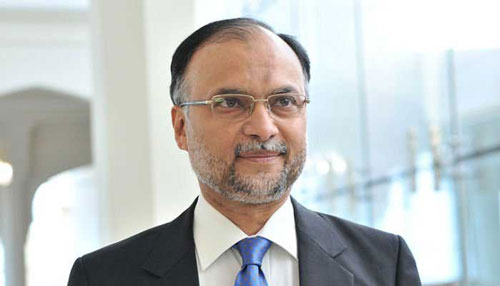Islamabad: In a meeting with senior officials of the Ministry of Federal Education and Professional Training on Friday, Planning Minister Ahsan Iqbal emphasized the urgent need for transformative reforms in Pakistan’s education sector.
Addressing the critical issues surrounding the outdated curriculum, the Minister underscored the necessity for a modern, forward-thinking approach to ensure the educational system meets the needs of the 21st century.
“The education sector must implement all necessary reforms without delay,” the Minister asserted. “Our educational curriculum remains a significant pain point for many parents, as they are acutely aware of how outdated and disconnected it is from the real-world demands of contemporary Pakistan.”
The Minister highlighted that the Vision 2025 initiative originally proposed four key areas of reform: curriculum revision, teacher training, overhaul of the examination system, and madrassah reforms. “Our current curriculum fails to align with the realistic needs of today’s Pakistan,” the Minister noted, calling for a thorough review and update to better prepare students for the future. He shared his vision of equipping madrassahs with basic science education so that they can be given high school or secondary school equivalence.
The Minister also addressed a notable setback regarding the initiative to transform high schools in Islamabad into smart schools. “Although we had a plan in place and a PC1 approved, changes in government led to the project’s stagnation. This is a loss we cannot afford,” the Minister remarked.
To propel these reforms forward, the Minister proposed convening a National Curriculum Summit. This summit would gather top experts, educationists, and business leaders to serve as panelists. The goal is to present a comprehensive curriculum reform plan that addresses current deficiencies and sets a clear path toward educational excellence.
“The Ministry of Education is, and must remain, the ministry of the future,” the Minister emphasized. “No country can achieve long-term success without a literacy rate of at least 90%. It is imperative that we invest in our education system now to ensure a prosperous future for all Pakistanis.”
Highlighting the alarming number of out of school children, the Minister stressed that immediate action is required to address these gaps. “The current state of our education system is a crisis that demands urgent intervention,” the Minister declared. “We have over 26 million children who are out of school, and our literacy rate stands at a troubling 61%. This is not just a statistic; it represents a significant barrier to our nation’s progress.”
Reflecting on past initiatives, the Minister noted significant achievements during their two tenures. “I worked diligently to open multiple doors of opportunity for the Higher Education Commission (HEC). However, the situation today is concerning. Our universities are facing severe financial crises, and there is a lack of performance audits across the board.” He also stated that there is no standardized formula of grant allocation percentages received by universities from federal and provincial government.
The Minister emphasized the critical difference between colleges and universities. “Colleges are primarily instructional institutions, but universities serve as hubs of research and innovation. The financial instability and lack of performance oversight are jeopardizing their role in advancing knowledge and contributing to national development.”
To address these issues, the Minister called for a comprehensive review and reform of the higher education sector. “We must ensure that our universities are well-funded, properly audited, and equipped to fulfill their role as centers of research and higher learning. Without these reforms, we risk further stagnation and decline.”
The Minister’s call to action underscores the need for systemic change in Pakistan’s education sector, aiming to improve literacy rates, expand access to education, and strengthen the higher education system.
Secretary Education Mohyeddin Wani briefed the Minister on the progress of several fast-track educational reform initiatives, highlighting significant advancements aimed at modernizing and enhancing Pakistan’s education system in the last one year.
During the briefing, it was announced that the new Financial Literacy curriculum, developed with the expertise of industry leaders, is set to launch on August 5th. This curriculum is a key part of the government’s commitment to equipping students with essential financial skills for the 21st century. In addition to Financial Literacy, the Ministry of Education is actively working on curricula for Entrepreneurship, Coding, Artificial Intelligence, and Climate Change. These programs are designed to address emerging global trends and prepare students for future challenges and opportunities.
Another major development is the end-to-end encryption of the Federal Board exam system. This enhancement is aimed at ensuring digital transparency and efficiency in the examination process, reflecting the Ministry’s dedication to maintaining the integrity of the educational assessment system.
To promote interest in foreign languages, around 2000 students will begin foreign language courses in German, Japanese, Arabic, and Korean and other languages, starting September 1st. This initiative underscores the Ministry’s focus on broadening students’ global competencies and fostering cross-cultural communication skills.
The Minister praised these advancements as critical steps towards improving the quality and relevance of education in Pakistan. “These initiatives represent a significant leap forward in our efforts to modernize the education system and prepare our students for a rapidly evolving world,” the Minister said.
He further stated that CPEC phase 2 framework covers education and shared mentioned his recent meeting with Vice Minister of Education in China who fully endorsed supporting Pakistan’s educational reforms.
China is implementing remarkable strategies to promote technical and vocational education, he highlighted.
He directed Secretary Education to have meeting with Chinese Education counsellor in embassy and engage him for collaborative projects. Furthermore, Minister directed Secretary to make a 5 year roadmap to be followed by the Education ministry and present sector wise progress updates in next meeting.



Comments are closed.